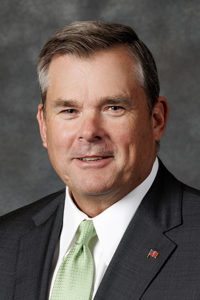Tax incentive rollback adjusted, advanced to final round
A proposal to scale back various state tax incentives advanced to final reading April 24 after senators amended it to retain a sales tax exemption on the lease of towers used to provide broadband service.

LB650, introduced by Elkhorn Sen. R. Brad von Gillern at the request of Gov. Jim Pillen, would eliminate, pare back or postpone tax credits and exemptions to generate revenue intended to help lawmakers balance the state budget.
As amended on the first round of debate, the bill would:
• decrease tax credits for qualified shortline railroad maintenance expenditures from $1 million to $500,000 per year;
• decrease film and television production credits from $1 million to $500,000 per year;
• decrease annual credits for biodiesel retailers from $1.5 million to $1 million beginning with fiscal year 2025-26;
• decrease annual credits for installation of reverse osmosis systems;
• decrease the amount that businesses are allowed to deduct for collecting and remitting state sales tax;
• eliminate a food donation tax credit; and
• end applications for incentives under the Urban Redevelopment Act.
The measure would end tax credits under the Creating High Impact Economic Futures Act after 2025. Unused credits still could be carried forward.
The bill also would prohibit the state Department of Economic Development director from accepting program certification applications for renewable chemical production tax credits from 2026 through 2029. Beginning in 2030, the director again could accept applications for up to $6 million in credits per year.
LB650 would create the Community Development Assistance Act. Under the program, individuals and businesses could apply for a tax credit for contributions they make to certain programs offered by community betterment organizations. Up to $350,000 in credits could be approved annually beginning with tax year 2026.
The state Department of Revenue estimates that LB650 would increase state general fund revenue by $7.8 million in FY2025-26, $41.7 million in FY2026-27 and $49.4 million in FY2027-28.
As amended on general file, LB650 would decrease the annual limit on livestock modernization or expansion credits under the Nebraska Advantage Rural Development Act from $10 million to $1 million beginning in 2026.
On select file, von Gillern introduced an amendment, adopted 32-0, that would lower the cap to $7.5 million in 2025. The $1 million cap still would take effect next year.
The bill also would decrease the annual limit on a credit for employers to help offset the relocation expenses of qualifying employees from $5 million to $1 million beginning in 2026. Under von Gillern’s amendment, the lower cap would take effect this year.
Von Gillern said the changes would increase state general fund revenue by an additional $6 million over the current biennium.
LB650 also would repeal a sales tax exemption on the gross income received for the lease of towers used to provide internet access and agricultural GPS locating services.
Sen. Bob Hallstrom of Syracuse introduced an amendment, adopted 30-10, to retain the exemption.
He said the Department of Revenue had not taxed the lease payments for decades but began collecting tax on them a few years ago after changing its interpretation of the law. In response, Hallstrom said, the Legislature exempted the payments in 2021.
By repealing the exemption, Hallstrom said, LB650 would increase costs for telecommunications companies and their customers and potentially delay broadband deployment across the state.
Lawmakers rejected a proposed amendment that would have allowed businesses to deduct a slightly greater amount of the sales taxes they collect and another that would have removed provisions related to the CHIEF Act, Urban Redevelopment Act and Community Development Assistance Act.
After adopting a technical amendment offered by von Gillern, senators voted 34-5 to advance LB650 to final reading.


